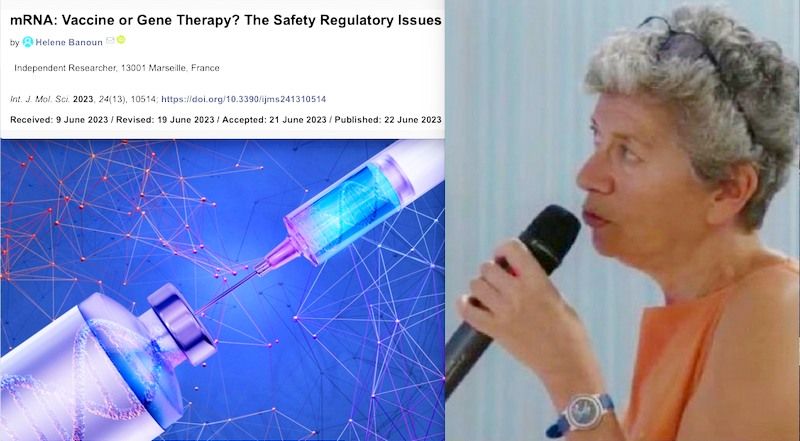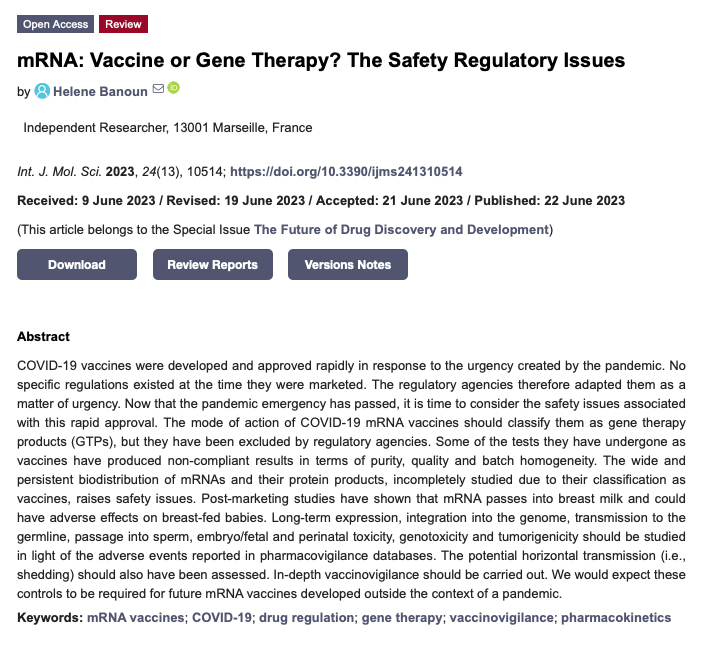“mRNA COVID-19 Vaccines are Like Gene Therapy Products”

By VT - Fabio G. C. Carisio -July 30, 2023474 1
French Study Highlighted Omitted Controls on Genotoxicity.
For about two years Europe has been addressing the problem of the exact qualification of the so-called RNA (or messenger DNA) Covid vaccines which all doctors and scientists aware of the new and experimental pharmacological biotechnology have defined as “gene serums” to distinguish them from traditional vaccines.
Well, now the study by the independent French researcher Helene Banoun of Marseille published in the International Journal of Molecular Sciences on June 9, 2023, and peer-reviewed on June 19 states that these are gene therapies and therefore should have been subjected to a significant number of pre-marketing studies according to the rules of the European Medicines Agency,

«COVID-19 vaccines were developed and approved rapidly in response to the urgency created by the pandemic. No specific regulations existed at the time they were marketed. The regulatory agencies therefore adopted them as a matter of urgency. Now that the pandemic emergency has passed, it is time to consider the safety issues associated with this rapid approval.
The mode of action of COVID-19 mRNA vaccines should classify them as gene therapy products (GTPs), but they have been excluded by regulatory agencies. Some of the tests they have undergone as vaccines have produced non-compliant results in terms of purity, quality, and batch homogeneity».
The French scientist highlights the same critical points highlighted by the research of the Italian biochemist Gabriele Segalla on the dangerous and unstudied toxicity of the nanoforms contained in the Comirnaty vaccine produced by the American pharmaceutical company Pfizer together with the German Biontech, the most widespread “vaccine” against Covid in the West.
«The wide and persistent biodistribution of mRNAs and their protein products, incompletely studied due to their classification as vaccines, raises safety issues. Post-marketing studies have shown that mRNA passes into breast milk and could have adverse effects on breast-fed babies – writes Banoun in the abstract –
Long-term expression, integration into the genome, transmission to the germline, passage into sperm, embryo/fetal and perinatal toxicity, genotoxicity, and tumorigenicity should be studied in light of the adverse events reported in pharmacovigilance databases.
The potential horizontal transmission (i.e., shedding) should also have been assessed. In-depth vaccine vigilance should be carried out. We would expect these controls to be required for future mRNA vaccines developed outside the context of a pandemic».
Dr. Banoun then concludes her study by highlighting the well-known toxicity of the Spike protein inoculated into the human body by messenger RNA vectors which cause its reproduction in DNA plasmids well beyond the short time estimated by Big Pharma.
«Although the principle of action of COVID-19 mRNA vaccines corresponds to the definition of gene therapy products (GTPs), they have been excluded from the regulation of GTPs by the regulatory agencies (US-FDA and EMA) and subjected to the regulation of vaccines against infectious diseases. No scientific or ethical justification is given for this exclusion, and there remain inconsistencies in the regulations. For example, under European and French regulations, a vaccine must contain an antigen, which is not the case for mRNA vaccines».
«These products could be considered “pro-vaccine”. In fact, mRNA vaccines do not contain an antigen, but make the vaccine produce it. They can therefore be classed as pro-drugs or “pro-vaccine”. Special regulations should be drawn up for this type of product, insisting on potency controls, i.e., the quality, quantity, duration and sites of expression of the antigen of interest, as well as the toxicity of this antigen. As proposed at the start of 2020, the SARS-CoV-2 spike protein interacts with the renin-angiotensin system [101,102,103] and has a recognized toxicity that was known since before COVID-19 [104] and has been confirmed since [105,106,107,108]» concluded Banoun.
This research, which cites 119 scientific references, received no external funding but the publication fees were paid by the French Ngo AIMSIB Association Internationale pour une Médecine Scientifique Indépendante et Bienveillante.
Below is a detailed analysis of the study made by American investigative journalist Megan Redshaw.
Fabio Giuseppe Carlo Carisio
© COPYRIGHT GOSPA NEWS
follow Gospa News on Telegram
MAIN SOURCES
GOSPA NEWS – CORONA VIRUS REPORTS
GOSPA NEWS – WUHAN-GATES DOSSIER
mRNA COVID-19 Vaccines Should Be Labeled Gene Therapy Products: Peer-Reviewed Paper
Originally published by Megan Redshaw in The Epoch Times
All the links to Gospa News investigations and the headlines have been added aftermath for the multiple correlations with the topics covered.
Now that the pandemic has ended, researchers are urging regulatory agencies to consider the safety issues associated with the rapid approval of COVID-19 vaccines—and to correctly classify messenger RNA (mRNA) vaccines as gene therapy products (GTPs) to prevent pharmaceutical companies from bypassing regulatory standards.
According to a paper published in the International Journal of Molecular Sciences on June 22, COVID-19 mRNA vaccines, by mode and action, are gene therapy products and should adhere to different regulatory standards. Yet U.S. and European regulatory agencies have not classified COVID-19 mRNA vaccines as gene therapy products, which has allowed them to be regulated as vaccines against infectious diseases instead of being subjected to the more stringent regulation of GTPs.
Because current regulatory guidelines either do not apply, do not mention RNA therapeutics, or do not have a widely accepted definition for these products, regulatory agencies adopted a modified and accelerated approval process for COVID-19 vaccines in the form of a “rolling review.”
A rolling review is a regulatory tool typically used during a public health emergency to speed up the assessment of data for medicines or vaccines. It allows data to be reviewed as it becomes available—without the complete data package or specific controls.
This process led to broad and continuous biodistribution of mRNA COVID-19 vaccines that were not thoroughly studied and yielded tests with non-compliant results regarding purity, quality, and batch homogeneity. Manufacturers are now planning to replace classic vaccines with mRNA vaccines using the same process—starting with influenza vaccines.
Vaccines With mRNA Technology Are Gene Therapies
The Centers for Disease Control and Prevention currently defines a “vaccine” as a preparation used to stimulate the body’s immune response against diseases. However, the agency’s definition was changed in 2021 out of concern it didn’t apply to COVID-19 vaccines.
A vaccine must contain an antigen to trigger the body’s natural immune response. Pfizer and Moderna’s mRNA vaccines do not contain antigens. The active substance used to elicit an immune response in these vaccines is the mRNA—a form of nucleic acid and the genetic material of the SARS-CoV-2 virus that provides instructions to the body for producing antigens—spike proteins.
In other words, the mRNA is not the substance causing active immunization. Instead, the mRNA must be translated into protein by the cells of the person vaccinated, and that person’s immune system must produce its own antigens to trigger an immune response.
The U.S. Food and Drug Administration (FDA) states that gene therapy seeks to “modify or manipulate the expression of a gene or to alter the biological properties of living cells for therapeutic use.” Moderna’s Q2 2020 filing with the Securities and Exchange Commission acknowledged that mRNA is “considered a gene therapy product by the FDA.” In addition, BioNTech founder Ugur Sahin, in a 2014 article stated, “One would expect the classification of an mRNA drug to be a biologic, gene therapy, or somatic cell therapy.”
According to the FDA, mRNA vaccines are comparable to the TypeIA of prodrugs—substances that, after administration, are converted in the body into pharmacologically active drugs.
This “prodrug property” could suggest that additional controls should be applied in addition to those required for vaccines. However, neither the FDA nor the European Medicines Agency (EMA) have referenced these qualifications for mRNA COVID-19 vaccines.
“With a conventional vaccine, you have the antigen, and you inject it into a person, and that is the thing that your immune system looks at and says, ‘ah ha,’ we need to make antibodies, T-cells, and other immune system components to what’s being injected,” said Dr. David Wiseman, a research scientist with a background in pharmacy, pharmacology, and experimental pathology, in an interview with The Epoch Times.
“The prime reaction of an mRNA vaccine is that it instructs the body how to make the antigen of interest. So, it’s similar to a prodrug, which is converted inside the body via metabolism and enzymes into the desired drug effect. The substance you’re injecting isn’t doing the final action; it leads to the thing that does the final action. With a prodrug, the molecule you inject does not get changed into the final molecule of the antigen, it simply provides instructions because it’s gene therapy.”
Wiseman said the FDA and EMA guidance and regulations that discuss gene therapy all define gene therapies “more or less” the same way. However, a number of years ago, the FDA decided to exclude vaccines for infectious diseases from its various guidance for unknown reasons, including vaccines made from gene therapy technology. Vaccines, in essence, were given their “own set of rules.”
However, the FDA can “change or exclude whatever they want from regulatory guidance, but it doesn’t change the biologic definition of the product,” said Wiseman. “Since Pfizer and Moderna COVID-19 vaccines meet the definition of gene therapy, they should be handled according to gene therapy guidelines.”
mRNA COVID-19 Vaccines Bypassed Essential Studies
According to the paper, because mRNA COVID-19 vaccines were not classified as gene therapy, necessary tests required for GTPs were not performed for the following:
- Genotoxicity.
- Genome integration.
- Germ-line transmission.
- Insertional mutagenesis.
- Tumorigenicity.
- Embryo/fetal and perinatal toxicity.
- Long-term expression.
- Repeated toxicity.
- Excretion in the environment, such as shedding through seminal fluid or breast milk.
“The long-term safety monitoring of GTPs is required over several years whereas, for vaccines, it is generally only carried out over a few weeks,” wrote Dr. Helene Banoun with the French Institute of Health and Medical Research in the paper. “This should not be acceptable, given the persistence of the drug product and the expressed protein.”
In addition, known results of anti-cancer therapies that use gene therapy technology and mRNA vaccines could lead us to anticipate safety and efficacy problems, she added.
In the EU, gene therapy medicinal products are required to undergo “tests or trials to evaluate the risk of genome integration and germ-line transmission, even if this integration is unlikely,” and tests and clinical trials to evaluate the risk of “insertional mutagenesis, tumorigenicity, embryo/fetal and perinatal toxicity, and long-term expression.”
EMA requires “extensive studies on both the nucleic acid and the vector particle/delivery system that includes biodistribution, dose study, potential target toxicity, the identification of the target organ to obtain biological activity, toxicity linked to the expression of structurally altered proteins.”
It is necessary to insist pharmacokinetic studies be performed to determine how the body interacts with the administered substance during the entire duration of exposure—even though they are generally not required for vaccines unless there’s a new formulation or a vaccine contains novel adjuvants or excipients (inactive substances such as preservatives).
For GTPs, shedding studies are also needed to determine excretion and dissemination in the body, and biodistribution studies are needed to assess where injected compounds—such as lipid nanoparticles, the delivery system used to deliver mRNA—travel in the body and which tissues or organs they accumulate in.
After assessing Pfizer and Moderna’s COVID-19 vaccine documents obtained by attorney Aaron Siri through the Freedom of Information Act, Wiseman noted many studies listed in nonclinical summaries that should have been performed but were not.
“Several studies should have been done but weren’t done because they fell under the auspices of vaccines. But if you read the guidelines, it doesn’t say these studies are unnecessary, just that circumstances may deem them unnecessary,” Wiseman said. “We need laws for products that say you can’t just exclude them from regulations because you feel like it—because they are still gene therapies,” he said.”We are hijacking the machines of our bodies to produce spike proteins in an uncontrolled, undefined way—there are too many things we don’t know about.”
Originally published by Megan Redshaw in The Epoch Times
Megan Redshaw J.D. is an attorney and investigative journalist with a background in political science. She is also a traditional naturopath with additional certifications in nutrition and exercise science.
SOURCE Gospa News

Fabio G. C. Carisio
Fabio is the Director and Editor of Gospa News; a Christian Information Journal. Fabio Giuseppe Carlo Carisio, born on 24/2/1967 in Borgosesia, started working as a reporter when he was only 19 years old in the alpine area of Valsesia, Piedmont, his birth region in Italy. After studying literature and history at the Catholic University of the Sacred Heart in Milan, he became director of the local newspaper Notizia Oggi Vercelli and specialized in judicial reporting.
